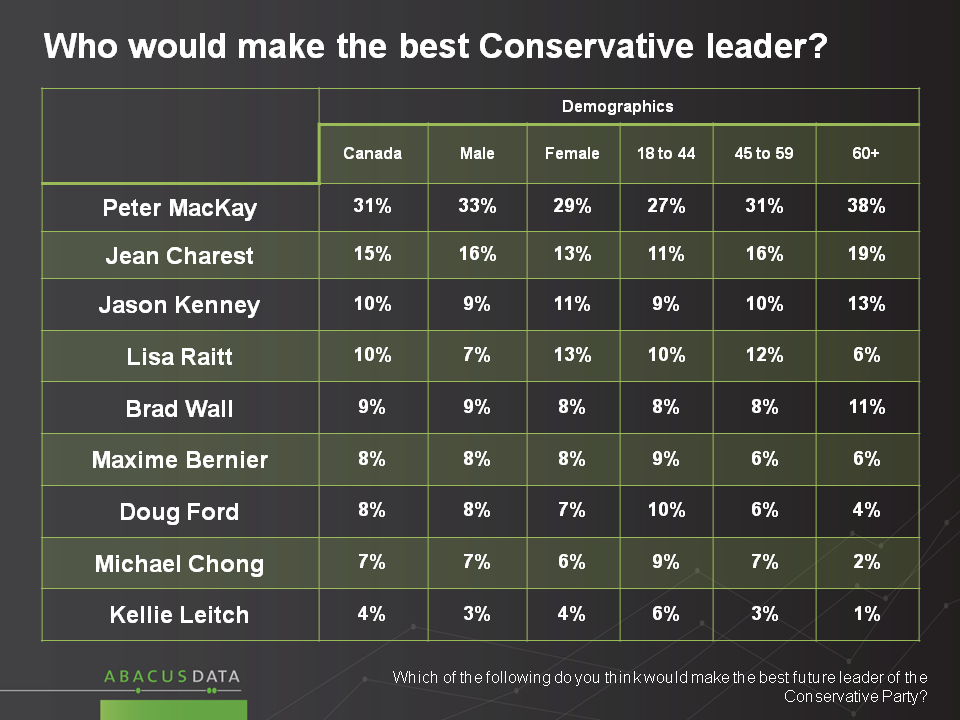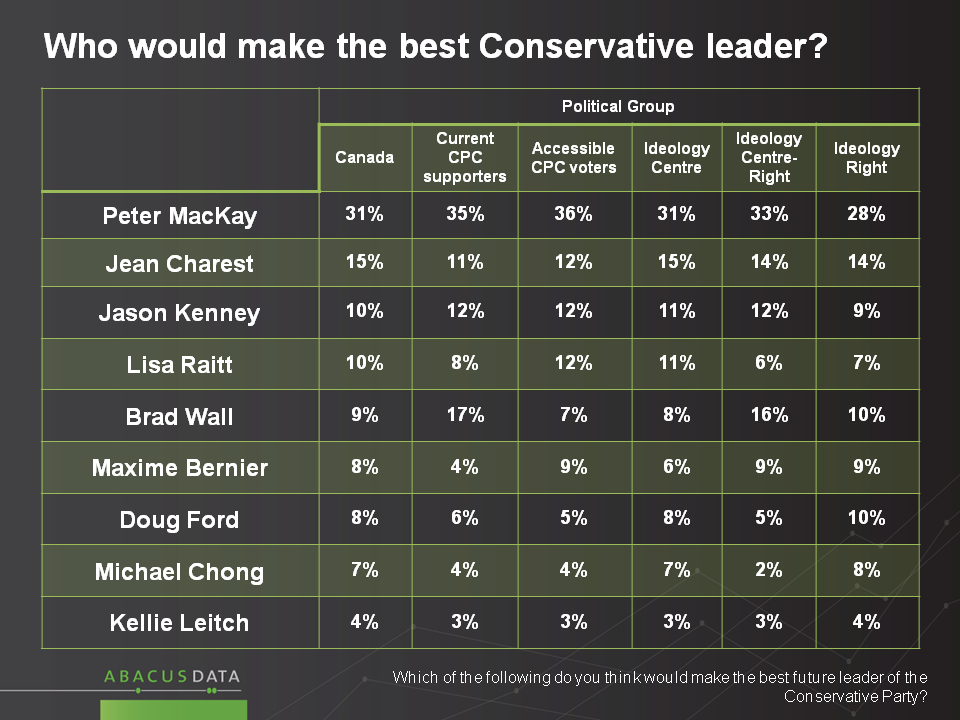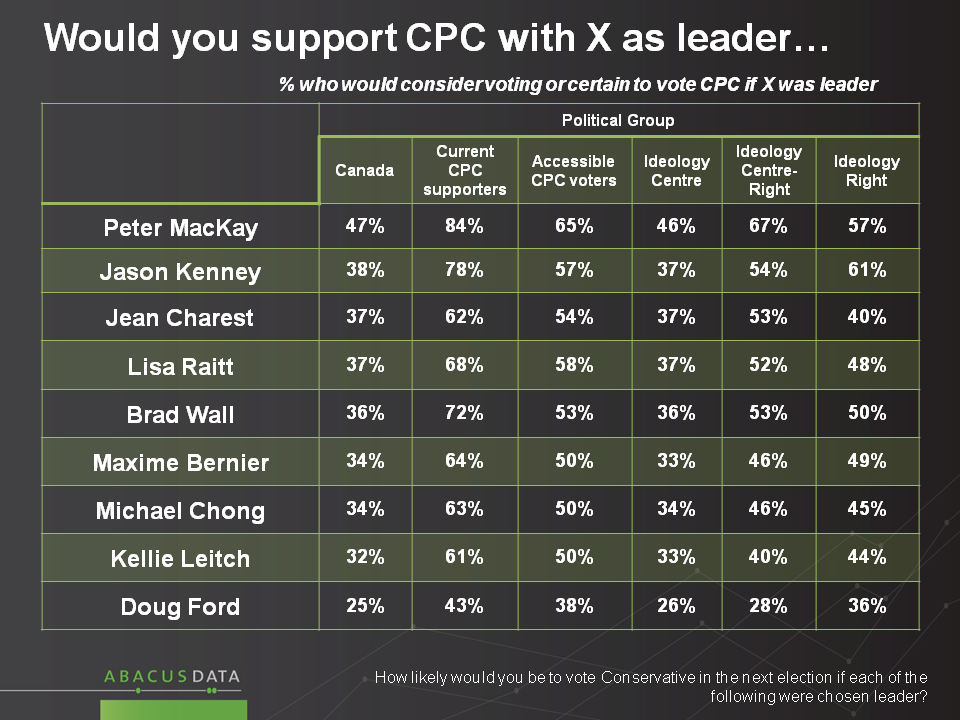Early Handicapping of the CPC Leadership Race: MacKay on top
December 7, 2015
In our most recent nationwide public opinion survey, we tested support levels for 9 people whose names have been rumoured as people who might make good candidates for the leadership of the federal Conservative Party.
Undoubtedly, other names may be added and some subtracted from this list next time we do this survey, as people rule themselves in or out as candidates, but this set of data helps us understand going in levels of familiarity and enthusiasm.
Also, it almost goes without saying that public opinion, and even the opinion of Conservative voters, might not reflect the views of CPC activists who will vote in the leadership race. These numbers are more a reflection of the broader community in which the CPC operates and seeks to attract support.
Five top tier contenders; Peter MacKay with an early advantage
Five of the nine names tested have more substantial or broadly based support than the other four. The leading group would include Peter MacKay, Jean Charest, Jason Kenney, Lisa Raitt, and Brad Wall. The second group includes Max Bernier, Doug Ford, Michael Chong and Kellie Leitch.
Peter MacKay would start a leadership race with a sizeable public opinion lead (31%), including strength among current and accessible Conservative voters, and people who describe themselves as on the centre of the spectrum, a group the Conservatives need to court in order to be in a position to win an election.
Jean Charest (although of this field he may be the least likely to enter a race), would command substantial initial support (15%). When it comes to accessible (not current) CPC voters, Charest would do substantially better than all of the other candidates save MacKay.
Jason Kenney and Lisa Raitt both poll at 10% across the country. Ms. Raitt’s support is a bit stronger among accessible rather than core voters; the opposite appears true for Kenney, but these are mild differences at this point.

Some important differences are found in regional breakdowns:
• MacKay’s support out of the gate would be heaviest in Atlantic Canada (49%) but fairly substantial in other regions as well, including 33% in Ontario.
• Jean Charest would find no less than 11% in any region of the country and 23% in Quebec.
• Brad Wall finds 26% support in the Prairies, but at only 6% in Ontario and 2% in Quebec would need to build up his recognition and support outside his home turf.
• Jason Kenney’s support is slight in Atlantic Canada (5%), but 10% in Ontario, BC and Quebec, and 13% in the Prairies.
• Lisa Raitt finds fairly consistent support across different regions, and is tied for second in Ontario (with Charest and Ford)
• Doug Ford claims 12% support in Ontario, 9% in BC, but no higher than 5% anywhere else.
• Maxime Bernier finds 22% support in Quebec, putting him in a tight three-way cluster with Charest and Mackay in that province. His support in other parts of the country is more limited, and he polls at just 2% in Ontario.
• Michael Chong finds 10% support in BC and 7% in Ontario, suggesting he could tap into pools of people who have noticed and liked his stance on Parliamentary reform.
• Kellie Leitch would start the race with less name recognition and support only hitting 5% support in her home province of Ontario.
There are some other differences in support patterns that are worth noting as well.
• Lisa Raitt has almost twice as much support among women (13%) as among men (7%) Her support is fairly consistent across age groups. If anything, her support skews a bit younger.
• Peter MacKay has more support among men (33%) than women (29%), and his support tends to skew older, although he leads among all age groups.
• Jason Kenney’s support rises a bit with age. Gender differences are mild.
• If we look only at current CPC voters (24% of all voters) in this survey the race is led by MacKay (35%) followed by Wall (17%) Kenney (12%) Charest (11%), and Raitt (8%).
• If we look only at accessible CPC voters (“I’d consider the Conservatives but not voting CPC now”) the Mackay leads (36%) followed by Charest, Kenney and Raitt all at 12%.
• If we look only at those who describe themselves as on the right of the spectrum Mackay’s support is a bit lower (28%) followed by Charest (14%) Wall (10%) Ford (10%) Kenney 9%) Bernier (9%) Chong (8%). Raitt is at 7% within this group.
• If we look at centre right voters MacKay leads, and Charest, Wall, and Kenney are all closely bunched.
• Finally, among centre voters MacKay leads, followed by Charest, with Kenney and Raitt tied for third place. Brad Wall is a little further back among this group.



We also probed whether voters would vote or consider voting Conservative if each of the individuals tested were leader. The results show that MacKay would create a potential CPC pool of 47%, followed by Charest, Kenney, Raitt, Wall all at 36-38%. Bernier (34%) Chong (34%) Leitch (32%) follow a little further back. Doug Ford would clearly be the most difficult choice, as fully half say they would not consider voting CPC with him as leader, a far greater level of resistance than for any of the other candidates.

Looking at the results to these questions broken down by ideology reveals that Jason Kenney would slightly eclipse the potential of Peter MacKay among self described right-wingers. Mr. Kenney trails Mr. MacKay among centre right voters and centrist voters, when it comes to the potential to increase CPC support.

The Upshot
This race of course has not yet begun, and to some degree these numbers reveal largely name recognition. A lot can and often does happen once a campaign gets underway.
Nevertheless the patterns do suggest that some names tend to stand out from the rest and some people are know more as centre/centre right conservatives while others have more direct appeal on the right. Regional patterns of support matter too.
Taking a step back, it seems fair to conclude that as far as public, and indeed CPC public opinion is concerned, there may be a looming battle among those who favour a more pragmatic, less ideological Conservative Party and those who feel otherwise. Support for names like MacKay, Charest, Raitt suggest also that support in central and eastern Canada may, initially anyway, gravitate towards a candidate from a different part of the country.
By most accounts, Jason Kenney has formidable support across the base of the Conservative Party and among its activists. These numbers confirm his strength but also suggest the campaign may turn out to be a more competitive one than some have imagined.
Methodology
Our survey was conducted online with 1,500 Canadians aged 18 and over from November 23 to November 25, 2015. A random sample of panelists was invited to complete the survey from a large representative panel of over 500,000 Canadians, recruited and managed by Research Now, one of the world’s leading provider of online research samples.
The Marketing Research and Intelligence Association policy limits statements about margins of sampling error for most online surveys. The margin of error for a comparable probability-based random sample of the same size is +/- 2.6%, 19 times out of 20. The data were weighted according to census data to ensure that the sample matched Canada’s population according to age, gender, educational attainment, and region. Totals may not add up to 100 due to rounding.
Abacus Data Inc.
We offer global research capacity with a strong focus on customer service, attention to detail and value added insight. Our team combines the experience of our Chairman Bruce Anderson, one of Canada’s leading research executives for two decades, with the energy, creativity and research expertise of CEO David Coletto, PhD.




